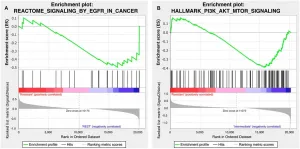Gulls, sentinels of bacteria in the environment
Seagulls birds can spread antibiotic-resistant bacteria that circulate in the wild
2021-02-10
(Press-News.org) Gulls are one of the main wild birds that act as reservoirs of Campylobacter and Salmonella, two most relevant intestinal antibiotic-resistant bacteria causing gastroenteritis in humans. Therefore, according to an article published in the journal Science of the Total Environment seagulls could act as sentinels of the antibiotic pressure in the environment.
The study was carried out by experts of the Faculty of Biology and the Biodiversity Research Institute (IRBio) of the University of Barcelona, and the Institute of Agrifood Research and Technology (IRTA).
Resistant bacteria to antibiotics represent a serious problem for human health and other species since they can harden the treatment of bacterial infections. According to the experts, wildlife fauna is a reservoir of resistant and multiresistant strains of bacteria and in particular, some animals -for instance, birds- have a great ability to spread these around the environment with their local and migratory movements.
Researchers analyzed nine colonies of two colonies of Southern Europe gulls, the yellow legged gull (Larus michahellis), and audouin's gull (Larus audouinii), an endemic species of the Mediterranean. All colonies featured bacteria from the Campylobacter and Salmonella genera, including resistant strains to antibiotics. "These bacteria are the main cause of gastroenteritis in humans. Largely, we isolated the Campylobacter jejuni species, as well as some Salmonella serotypes common in human salmonellosis outbreaks, such as Salmonella Typhimurium", notes Marta Cerdà, researcher at IRTA's Animal Health Research Centre (CReSA).
Resistant bacteria's threat to wildlife
In many industrialized countries, the main source of infection regarding these pathogens in humans is the consumption and handling of contaminated food from bird origins (specially meat and eggs). However, apart from these production animals, wild fauna plays a relevant role in the epidemiology of these bacterial infections. "Gulls are getting more used to find food in urban areas or landfills, where they find many leftovers. Therefore, these are likely to get infected by human-origin bacteria", notes professor Jacob González-Solís Bou, head of the Group on Seabird Ecology and member of the Department of Evolutionary Biology, Ecology and Environmental Sciences and the Biodiversity Research Institute (IRBio) of the UB.
Moreover, gulls spread these bacteria around different parts of the territory with their local and migratory movements, favouring these resistant bacteria to move around the environment permanently. In general, these bacteria are not dangerous to gulls nor the wildlife, although certain salmonellosis outbreaks that caused the death of bird colonies (in the United States) have been detected.
"It is crucial to study the presence of resistent bacteria in wild fauna considering a one health approach, mainly in these cases of pathogens that can affect both animals and people", conclude the experts.
INFORMATION:
[Attachments] See images for this press release:

ELSE PRESS RELEASES FROM THIS DATE:
2021-02-10
BOSTON - How often a person takes daytime naps, if at all, is partly regulated by their genes, according to new research led by investigators at Massachusetts General Hospital (MGH) and published in Nature Communications. In this study, the largest of its kind ever conducted, the MGH team collaborated with colleagues at the University of Murcia in Spain and several other institutions to identify dozens of gene regions that govern the tendency to take naps during the day. They also uncovered preliminary evidence linking napping habits to cardiometabolic health.
"Napping is somewhat controversial," says Hassan Saeed Dashti, PhD, RD, of the MGH Center for Genomic Medicine, co-lead author of the report with Iyas Daghlas, a medical student at ...
2021-02-10
Alongside the effects of lifestyle, including physical exercise and diet, on ageing, research has increasingly turned its attention to the potential cognitive benefits of musical hobbies. However, such research has mainly concentrated on hobbies involving musical instruments.
The cognitive benefits of playing an instrument are already fairly well known: such activity can improve cognitive flexibility, or the ability to regulate and switch focus between different thought processes. However, the cognitive benefits of choir singing have so far been investigated very little.
Now, a study recently ...
2021-02-10
BOSTON - When patients arrive in emergency departments and hospitals with symptoms consistent with COVID-19, it's critical to isolate them to avoid the potential spread of infection, but keeping patients isolated longer than needed could delay patient care, take up hospital beds needed for other patients, and unnecessarily use up personal protective equipment. A team led by investigators at Massachusetts General Hospital (MGH) has now created a tool to guide frontline clinicians through diagnostic evaluations of such patients so that they'll know when it's safe to discontinue precautions. The tool was developed and validated in a study published in Clinical Infectious Diseases.
In the spring of 2020, due to the risk of false-negative ...
2021-02-10
UPTON, NY--Scientists at the U.S. Department of Energy's Brookhaven National Laboratory, Stony Brook University (SBU), and other collaborating institutions have uncovered dynamic, atomic-level details of how an important platinum-based catalyst works in the water gas shift reaction. This reaction transforms carbon monoxide (CO) and water (H2O) into carbon dioxide (CO2) and hydrogen gas (H2)--an important step in producing and purifying hydrogen for multiple applications, including use as a clean fuel in fuel-cell vehicles, and in the production of hydrocarbons.
But because ...
2021-02-10
A team of Russian scientists from NUST MISIS, Tomsk Polytechnic University (TPU) and Boreskov Institute of Catalysis has suggested a new approach to modifying the combustion behavior of coal. The addition of copper salts reduces the content of unburnt carbon in ash residue by 3.1 times and CO content in the gaseous combustion products by 40%, the scientists found. The research was published in Fuel Processing Technology.
According to the International Energy Agency (IEA), coal is the predominant energy resource used as the primary fuel for power generation. According to reports, coal supplied over one-third of global electricity generation in ...
2021-02-10
Oncotarget published "Combination of copanlisib with cetuximab improves tumor response in cetuximab-resistant patient-derived xenografts of head and neck cancer" which reported that HNSCC is frequently associated with either amplification or mutational changes in the PI3K pathway, making PI3K an attractive target, particularly in cetuximab-resistant tumors.
Here, the authors explored the antitumor activity of the selective, pan-class I PI3K inhibitor copanlisib with predominant activity towards PI3Kα and δ in monotherapy and in combination with cetuximab using a mouse clinical trial set-up with 33 patient-derived xenograft models with known HPV and PI3K mutational status and available data ...
2021-02-10
Scientists and public health experts have long known that certain individuals, termed "super-spreaders," can transmit COVID-19 with incredible efficiency and devastating consequences.
Now, researchers at Tulane University, Harvard University, MIT and Massachusetts General Hospital have learned that obesity, age and COVID-19 infection correlate with a propensity to breathe out more respiratory droplets -- key spreaders of SARS-CoV-2, the virus that causes COVID-19. Their findings were published in Proceedings of the National Academy of Sciences.
Using data from an observational study of 194 healthy people and an experimental study of nonhuman primates with COVID-19, researchers found that exhaled aerosol particles vary greatly ...
2021-02-10
(New York, NY) February 10, 2021 - A research team led by the Icahn School of Medicine at Mount Sinai (Icahn Mount Sinai) has built the first cellular model to depict the evolution of acute myeloid leukemia (AML), from its early to late stages. By using gene editing technologies to alter genes that make cells malignant, the team was able to identify potential therapeutic targets for early disease stages. The study was reported in the journal Cell Stem Cell in February.
The therapeutic targets could be applicable not just to AML but also to the blood cancer myelodysplastic syndrome and clonal hematopoiesis, which is often a preleukemic condition.
"We essentially built from scratch a model of leukemia that characterizes the ...
2021-02-10
Global emissions of a potent substance notorious for depleting the Earth's ozone layer - the protective barrier which absorbs the Sun's harmful UV rays - have fallen rapidly and are now back on the decline, according to new research.
Two international studies published today in Nature, show emissions of CFC-11, one of the many chlorofluorocarbon (CFC) chemicals once widely used in refrigerators and insulating foams, are back on the decline less than two years after the exposure of their shock resurgence in the wake of suspected rogue production.
Dr Luke Western, from the University of Bristol, a co-lead author of one ...
2021-02-10
When we tear a muscle " stem cells within it repair the problem. We can see this occurring not only in severe muscle wasting diseases such as muscular dystrophy and in war veterans who survive catastrophic limb injuries, but also in our day to day lives when we pull a muscle.
Also when we age and become frail we lose much of our muscle and our stem cells don't seem to be able to work as well as we age.
These muscle stem cells are invisible engines that drive the tissue's growth and repair after such injuries. But growing these cells in the lab and then using them to therapeutically replace damaged muscle has been frustratingly difficult.
Researchers at the Australian Regenerative Medicine Institute at Monash University in Melbourne, ...
LAST 30 PRESS RELEASES:
[Press-News.org] Gulls, sentinels of bacteria in the environment
Seagulls birds can spread antibiotic-resistant bacteria that circulate in the wild




